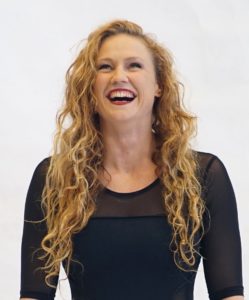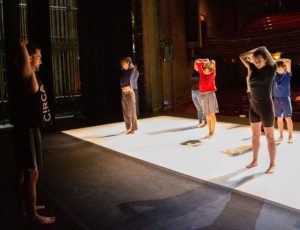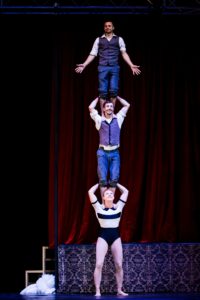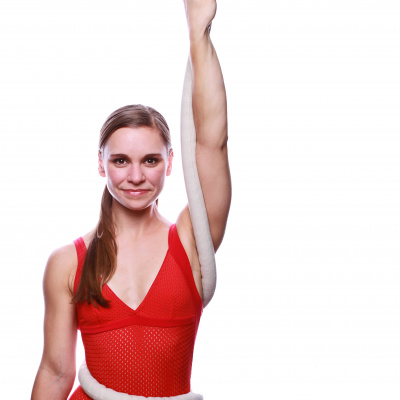PRO EXCLUSIVE – Casting Agents: Get Curious! Advice for People Behind the Table
Auditions are stressful. Everyone in the room has fingers crossed: auditioners want to be cast; casting teams want just the right person for a role. It’s a two-way street. There’s lots of advice out there for the auditioner, those “in front of the table” who are seeking the next great gig. This article flips the focus and offers people “behind the table” guidance from the extraordinary Rowan Heydon-White, Head of Circus for Circa. If you’re a budding director, a new casting agent, a rehearsal director, or anyone with a seat behind the table, Heydon-White has some sage advice for you.

Heydon-White is a creator, performer, trainer and leader with over 15 years experience in the circus sector. She has toured to over 23 countries and performed for more than half a million audience members while working as a collaborator and acrobat with companies such as Circus Oz, Legs on the Wall, and Circa. Heydon-White ran her own company, won international awards, received academic scholarships, studied physical theatre, circus and holds a post-graduate degree in organizational culture and creativity research. As a Circa Ensemble member she delivered 922 performances, across 16 productions, including the world premiere seasons of En Masse, Beyond, Aura,and Landscape with Monsters.
Madeline Hoak: When casting, what is a less obvious pool of performers that you would advise someone to consider?
Rowan Hayden-White: The thing we overlook a lot is casting straight from youth circus rather than through diploma or degree programs. When I’m casting, I don’t just look at who has graduated from ENC or from NICA, I’m in conversation with people that are running major youth services in Australia. Because sometimes those graduates have been training since they were eight. For example, the Flying Fruit Fly Circus. They train five days a week. Those graduates come out of there ready to go. That’s a field that I feel gets overlooked sometimes because they [casting agents] just assume that a performer will be better if they go to an institution. Sometimes you’re better served picking a performer up early and developing them in the company so that they really embody that company culture.
MH: How do you assess someone is going to be a good fit for the company culture?
RHW: When you’re in that process of casting, finding out someone’s personality is really difficult in five minutes, or half an hour, or an hour. The best way I find out a person’s personality is for them to be referred to me by someone I respect. One of our [Circa’s] main goals is we only hire good humans. It doesn’t matter if you can do a triple twisting double back. If you’re not a great person to work with, there’s no point being in the room.
I ask them about their plans, their passions, what drives them to train, and how they got into circus. Another question is what they thought of recent shows because this gives me an idea of the reason they love circus. For so many circus people, circus becomes part of their identity. It’s not just a job we do. It’s part of their core, and it’s good to know where that core has come from, what’s nurtured it, and how it’s developed. Automatically, they’ll either speak about the show artistically or from a skill perspective. Neither is right or wrong, it’s more about how I try and understand them. It gives me an idea of how their artistic integrity is going to line up with the company’s artistic integrity, which then folds back into the company culture.
The other thing I do is take little notes on small things. For example, in our company culture, we are always on time. We see being late as disrespectful to everyone else in the room. So, I see if they rock up on time. When you’re a new casting director, or when you’re coming into that role for the first time, I would encourage people to take note of all the things that they think are unimportant. That will give you an idea into who that person is, which is really hard to grasp in the one hour that you have with them. It’s finding the ways around that [time limitation] that speak to something about them.

MH: How can digital casting be as successful as possible?
RHW: Get clear on your checklist: what is it you’re looking for, what it is that would meet those requirements, and what can be flexible. Get specific on what you want, and you can pretty quickly tick those boxes. (But, I also always have a folder for that person that [doesn’t tick the boxes but] I’m interested in.) That list is different for every company. For us, I need to check the skill box first, then I need to investigate if they’re good human, and then I need to see them artistically.
We’ve been doing everything in a digital medium, but it’s not necessarily video submissions. It’s meetings on Zoom even if it’s in their lounge room. They don’t have to do any skills. I just want to see them walk onto the camera and do this creative exercise that me or one of the associate directors have put together. I want to see what choices they make when they’re in the moment, not when they have had all this time to preplan, and edit, and all that jazz.
If I’m really interested in someone but there’s just not enough in a video for me to make a decision, I ask them to go into the studio and just film–let’s say it’s hula hoop–five tricks in a row that they haven’t necessarily thought about. I want to see them making it up on the spot. I don’t want them to edit it, put it to music, or anything like that. I want to see their personality when they’re training or when they’re making choices. What that does is it speaks to how they play, and play is really important when we’re casting. The majority of stuff we make is inventive or innovative, and they need to be able walk into a space and play–not just with the tricks they know, but how can they mess with that trick? What choice can they make? How can they do that transition differently? So for digital casting, the easiest way I found to do that is to either get them on Zoom and give it a go, or ask them to film raw footage. To see what they do in their everyday world is really important to me.
To add to all that, I would advise casting directors to get specific, and then throw it all out. Think again, and say, have I looked at this the wrong way? Am I boxing myself into a corner? Get what you think might be right, and then put it in a corner for a while, and try something completely different to see if another solution arises.
MH: How can casting directors insist on diversity and inclusion without tokenism?
RHW: We’ve thought about that a lot, particularly in this company. Circa has a First Nations Action Plan and are implementing a Disability Equity Action and Inclusion Plan as well. When it comes back to the casting side of things, striving for that diversity in the ensemble is constantly there, and I think it’s a long-term plan. Being able to go, okay, I want an extremely diverse ensemble in ten years time, I need to start now with the youth circuses, the pre-professionals, and the engagement programs that allow people to come in to get that first taste of circus, and then come into a training center and get training so their level is up there. I’m a massive believer in positive action towards that. It really comes back to us being responsible for pushing that engagement in new circus, celebrating that, and using positive action that makes things and facilitates that even more accessible so that in ten years we have a diverse ensemble without it being a tokenistic gesture. And it should have happened; it should have happened 20 years ago. You can’t go backward, so you just got to try now.

MH: Do you have one final “gem” of advice to pass on?
RHW: How I cast is definitely not going to be the same way for you. For young casting directors, instead of listening to my advice, they need to go to their bosses and say, “How do I deliver the person you need?” You really have to answer what it is that your company wants. That is the most important thing.
The real gem in casting is not to get hung up. Technique is really important in circus–to be able to do amazing skills and do them at a high quality, but they are not the be-all and end-all of the reason I cast someone, ever. I cast someone when they can make compelling stage time when they’re alive, when they’re seeing the world, when they’re engaged. If you’re a young casting director, and you’re just trying to get the best possible acrobat to do the best possible thing, then, of course, there’s someone out there. For us, our company wants compelling stage time, and that’s what we look for in the human that we’re casting. That means that we apply that word “human” to their skills as well. If they do a stunning piece, by their leg wasn’t straight, or their toe wasn’t pointed, I don’t care, because I was interested watching it. It [technique] is less important than I would have once thought when I started this process. And that’s why it becomes so important to think again about what you’re looking for after you think you’ve pegged what you’re looking for. Because a checklist will never be as good as someone that’s alive and interesting onstage. Even if that means you have to switch your whole cast around!
One phrase that I always work around is “get curious.” Because it applies to everything. It applies to the people you’re casting: get curious about them! It applies to learning how to cast better: ask the directors around you, ask question of people you talk to at festivals. Ask questions of your admin staff and your delivery team. Get their opinions. That whole web has a different perspective of the industry, and it’s not about taking it all on board, it’s just getting curious enough to ask those question that then help you think about it in a different perspective to see if what you’ve done is the right choice.
Featured Image: Hayden-White during the creative development sessions of Spanish Baroque in 2017. Photo courtesy of Circa.
Related content: Congratulations! You Graduated from Circus School…Now What?, Frequently Asked Questions: Auditioning for a Circus School, The Pivot: Episode 5 – Get Prepared! Demo Reels and Casting Advice With Charlie Burrows
...Do you have a story to share? Submit your news story, article or press release.



